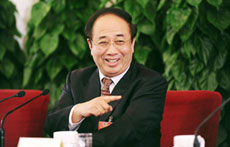Imported dairy dominates China's market
By Qiu Bo (China Daily)
Updated: 2011-03-10 07:12
Beijing - The notorious melamine-tainted milk powder scandal exposed in 2008 triggered a surge of dairy product imports from 120,000 tons that year to 600,000 tons in 2009, a senior official said.
"Imported infant formula has since then accounted for almost 90 percent of the domestic market," Liu Peizhi, a member of the National Committee of the Chinese People's Political Consultative Conference (CPPCC), who is also deputy head of the executive office of the State Council Food Safety Commission, said on Wednesday, during the ongoing annual session of the CPPCC National Committee.
| ||||
Reports showed the US government recalled hundreds of million salmonella-tainted eggs that had poisoned hundreds of consumers in 2010.
"Food safety's pitfalls in developed countries come more from the natural morbigenous (disease-causing) microorganisms and chemical hazards," Liu said.
"China's food safety incidents were mostly caused by human factors and the rampant use of illegal additives."
He added that although poor government supervision should be blamed for the incidents, the backwardness of the industry - marked by small-scale production and comparatively underdeveloped industrialization - was the real cause of supervision difficulties.
In the United States, for instance, 13 parent manufactories controlled 6,200 producers nationwide. Authorities directly punish the parent manufactory if any subsidiary is found to produce unsafe food.
Chinese authorities supervise 450,000 food-production companies, 80 percent of which are small plants with 10 or fewer workers. That is in addition to 2.1 million licensed restaurants and countless small food stalls. The US Food and Drug Administration oversees about 50,000 food producers - a more manageable supervision workload, Liu said.
The central government has introduced a slew of measures to tighten oversight of the dairy industry in recent years. The latest policy came out in November, when the General Administration of Quality Supervision, Inspection and Quarantine, the country's top food-quality regulator, released a new regulation requiring dairy manufacturers to reapply for their production licenses or face being shut down this year.
The Dairy Association of China issued a report afterward in which it estimated the regulation will eliminate more than 20 percent of the country's dairy companies.
But the dilemma Chinese consumers face is that they neither trust the quality of infant formula made by domestic producers nor can they easily afford the foreign brands' high prices.
Liu quoted an investigative report in the Beijing-based Xiaokang magazine, which said about 70 percent of Chinese people expressed "a lack of trust in food safety".
Another survey by the State broadcaster China Central Television indicated almost the same percentage of respondents in Beijing had low confidence in domestic milk powder. Neither survey disclosed the number of respondents.
Wu Peiyuan, a 27-year-old resident of Tianjin municipality, told China Daily he only buys baby formula produced overseas for his 3-month-old son, even it costs an extra 350 yuan ($53) a month.
Tang Zhiqing, a dairy industry analyst, said it will take time to rebuild the dairy industry's reputation, especially when the new regulation has not yet taken effect.
Liu called for the facilitation of relevant laws and regulations, the specification of regulators' responsibilities and the strengthening of supervision over raw materials.







